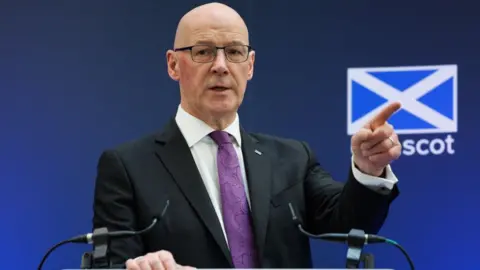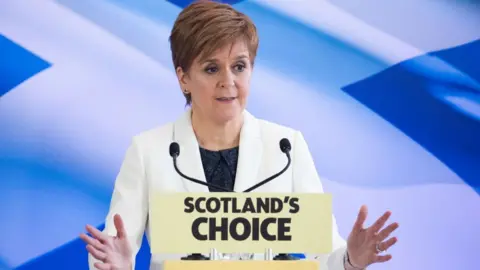Swinney's independence pitch could be key to SNP fortunes
 Getty Images
Getty ImagesJohn Swinney has outlined his strategy for achieving independence in The National newspaper.
The headline promises a "renewed" approach, but much of it feels familiar to what the first minister has been saying since he took over his party last year.
A three-pronged strategy has been proposed by the SNP leader.
First of all, he wants to see a campaign to build "the highest levels of support possible for independence".
There have been voices in the SNP for some time saying that an independence vote should be a rubber stamp on the "settled will" of the people of Scotland.
What is John Swinney's independence strategy?
Previously, when pressed on what demonstrable support looks like, Swinney has cited the 1997 referendum on devolution. In that vote, 74% of Scots wanted a Scottish parliament.
Secondly, the first minister has written that he wants to build "public pressure around Scotland's fundamental national rights".
Elsewhere in the article Swinney confirms that an "agreed democratic referendum" is the route to independence.
The Supreme Court has previously ruled that this power lies with the UK government.
So he wants to pile pressure on ministers in London to give the Scottish Parliament a say on when (and if) another vote happens.
How would he achieve that? See point one.
Finally, Swinney says an "emphatic" SNP win in next year's Holyrood election would help the ultimate cause of the party.
And this probably has a lot to do with why the first minister is outlining his proposals now.
 PA Media
PA MediaThe SNP's voter base is vastly in favour of independence (no shocks there).
He needs them to turn out and back his party next year. And he doesn't want them looking towards other pro-independence options – such as the Greens or Alba.
But is this an aggressive enough independence strategy for those who are impatient for constitutional change?
A broad plan has been outlined. The exact mechanics are still up in the air.
But his predecessors have been stung by offering too much on this issue.
Nicola Sturgeon previously set a date for a second referendum. She also pledged a general election could be a "de-facto" vote on independence.
Neither of those promises came to fruition.
Is independence still an SNP priority?
Humza Yousaf promised independence would be "page one, line one" of the SNP's 2024 general election manifesto. He was out of the job by that point, but that pledge remained.
The SNP then had a disastrous result, losing 39 seats.
Swinney has to try and inspire his followers on the independence question, but he also doesn't want to overpromise.
And he has a balancing act to manage. He doesn't want to be accused of focusing too forcefully on the constitution at a time when there are plenty of day-to-day issues to be addressed.
It does feel as though the independence issue has slipped down the agenda in recent times.
Sir Keir Starmer even went as far as claiming recently that the first minister had not brought it up with him as a "first priority".
He also indicated another vote would not happen while he was in Downing Street.
What makes an independence mandate?
There are signs that people on both sides of the argument are coalescing around a position – that support for independence has to get to higher levels if a second vote is to happen.
That is a position that was even outlined by former Conservative minister Michael Gove recently.
It is significant that Swinney is outlining his independence approach with an election looming. But there are still plenty of unanswered questions.
What level of support does he think independence needs to get to? How exactly will he convince a UK government to relent on a second referendum?
What represents an "emphatic" election win? If the SNP loses seats (which current polling suggests they will) could they really claim a mandate to move independence forward?
Swinney makes clear that independence is what he's in the job to achieve.
He's not the first SNP leader to say that.
There are voices in his party telling him to move quicker. And he will have others advocating a slow and steady approach.
Part of his success – or failure – in next year's election will depend on how he navigates this issue.
